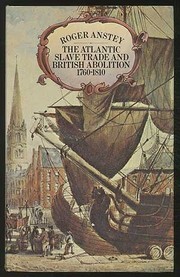Check nearby libraries
Buy this book

Few phenomena of modern history have cast so long a shadow as that of black slavery or branded themselves so deeply in the historical consciousness of both Africa and the Western world. Inevitably it has left a trail of controversy, not least among historians, who take violently opposed views of the internal effects of the slave trade upon Africa, who magnify or disparage its role in the Atlantic economy, and who assign widely differing explanations of British moves to secure its abolition. It is symptomatic of the paradox of much of our contemporary intellectual culture that under the influence of historical materialism it should instinctively deny an autonomous role to ideology while remaining itself so ideologically oriented. Yet the central statement of this viewpoint, Eric Williams' celebrated Capitalism and Slavery, undoubtedly threw a salutary douche of cold water over the smug complacency that had hitherto infected the received accounts of British abolition. The argument that British abolition, far from being an act of pure disinterested benevolence, fell into line with the country's economic interests and with the change from commercial to industrial capitalism has never been fully countered. The more exaggerated elements in his thesis have been duly assailed. That the profits of the slave trade should have been sufficiently large and well-directed to power the Industrial Revolution is a hypothesis as far-fetched as that which sees the wealth accumulated from the plunder of Bengal after the battle of Plassey as the main source of investment capital. Yet when purged of such exaggerated claims Williams' argument remains formidable. As D. B. Davis has acknowledged: "It is ... difficult ... to get around the simple fact that no country thought of abolishing the slave trade until its economic value had considerably declined." - Foreword.
Check nearby libraries
Buy this book

Previews available in: English
Subjects
Slave-trade, Antislavery movements, International - General, Africa, International trade, Slavery & emancipation, USA, United Kingdom, Great Britain, World history: c 1750 to c 1900, c 1700 to c 1800, c 1800 to c 1900, Business / Economics / Finance, Commerce, Slave trade, Mouvements antiesclavagistes, Esclaves, Abschaffung, Sklaverei, Slave trade, africa, Antislavery movements, great britainPlaces
Great Britain, West AfricaShowing 4 featured editions. View all 4 editions?
| Edition | Availability |
|---|---|
|
1
Atlantic Slave Trade & British Abolition (Modern Revivals in History)
February 1993, Ashgate Publishing
Hardcover
in English
- New Ed edition
075120112X 9780751201123
|
zzzz
Libraries near you:
WorldCat
|
|
2
Atlantic Slave Trade and British Abolition, 1760-1810
1992, Gregg Revivals
in English
075120112X 9780751201123
|
zzzz
Libraries near you:
WorldCat
|
|
3
The Atlantic slave trade and British abolition, 1760-1810
1975, Humanities Press
Hardcover
in English
0391003712 9780391003712
|
aaaa
Libraries near you:
WorldCat
|
|
4
The Atlantic slave trade and British abolition, 1760-1810
1975, Macmillan
in English
0333148460 9780333148464
|
zzzz
Libraries near you:
WorldCat
|
Book Details
Table of Contents
Edition Notes
Bibliography: p. [426]-433.
Includes index.
Classifications
The Physical Object
ID Numbers
Community Reviews (0)
Feedback?| December 17, 2022 | Edited by ImportBot | import existing book |
| February 28, 2020 | Edited by MARC Bot | remove fake subjects |
| January 10, 2020 | Edited by Bryan Tyson | Edited without comment. |
| January 10, 2020 | Edited by Bryan Tyson | Edited without comment. |
| December 10, 2009 | Created by WorkBot | add works page |












